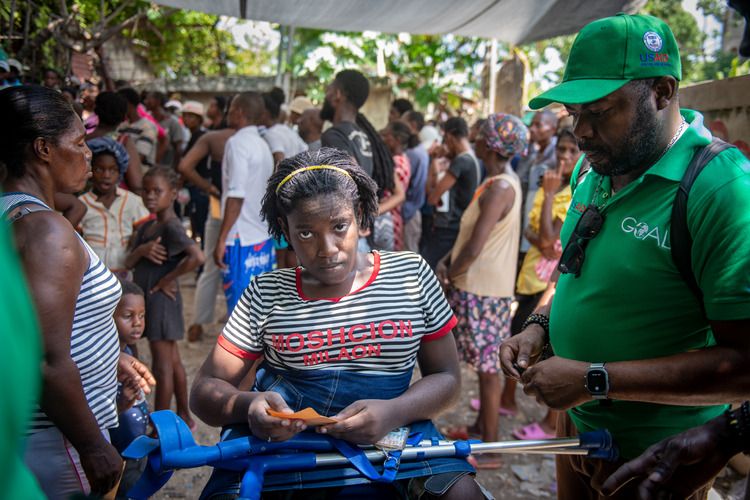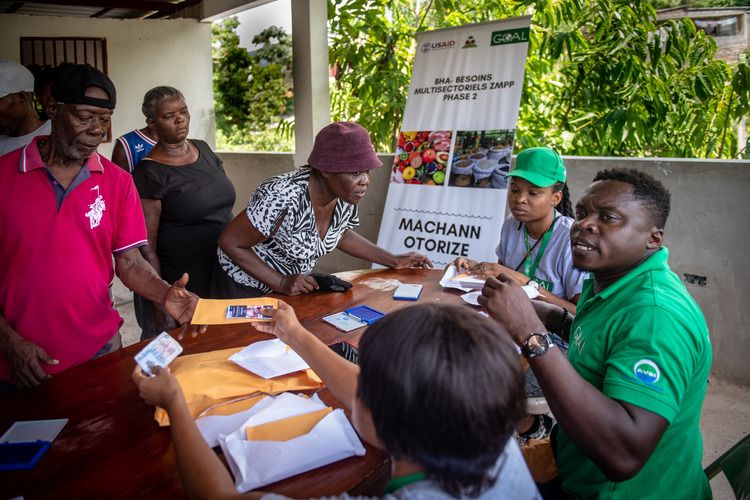 Blogs
Blogs
September 6, 2024 • 4 min read
Matt Knight has been the Country Director for GOAL Haiti since June of 2023. He was evacuated from the country earlier this year, after an uprising against Prime Minister Ariel Henry led to a significant escalation in violence. Matt has since returned to Port-au-Prince, where he leads a team of 78 in-country staff members.

Matt Knight, Country Director, GOAL Haiti
Forgotten Crisis in Haiti
The humanitarian crisis in Haiti has largely faded from global headlines. However, the country remains trapped in a national state of emergency. Killings and kidnappings are on the rise, and the most vulnerable in society face risks that are painfully and increasingly acute.
The United Nations estimates that by the end of 2024, more than half of the Haitian population will be suffering from severe food insecurity – an alarming statistic that highlights the gravity of the humanitarian crisis and urgency of GOAL’s response.
The political situation in Haiti is deteriorating. In a bid to stabilise the country, the first wave of 400 Kenyan police officers has recently commenced peacekeeping operations in Haiti’s capital, Port-au-Prince. Their mission, part of a larger Multinational Security Support (MSS) effort, is to assist the Haitian National Police in curbing the rampant violence that has gripped the city.

GOALies are responding to the crisis in Haiti by distributing food vouchers to vulnerable households.
Temporary Peace
On the surface, the arrival of Kenyan forces seems to have had a calming effect, particularly in comparison to the unchecked, indiscriminate violence and daily clashes witnessed during April and May of last year.
However, there is an undercurrent of mistrust among the local population. Many Haitians feel that the MSS lacks the resources needed to maintain even the temporary gains they have achieved. For now, it appears that their presence is merely keeping key areas, such as the airport, secure.
Rumors swirl about logistical shortcomings and discontent within the MSS, and locals fear that this effort is simply a band-aid on a much larger wound – a temporary measure that is not strong enough to withstand the extreme violence taking place on the streets of Port-au-Prince.
Outside of Port-au-Prince, the situation is even more dire. Cities like Ganthier have fallen entirely under gang control. A new humanitarian disaster is rapidly unfolding, and worryingly, there is little to no official response.

GOALies distributing food vouchers to vulnerable families n in Haiti’s capital, Port-Au-Prince.
Life in Port-Au-Prince
Daily life in the Haitian capital, Port-au-Prince, remains unpredictable. One day may feel almost normal, with quiet streets and a semblance of order. The next day, however, the city may be gripped by unrest, with burning tires and the sound of gunfire echoing through civilian neighborhoods.
For GOAL, the movements of our international staff are limited to a more secure area of Port-au-Prince, Petionville. Here, life may seem relaxed and calm, but the atmosphere is one of fragile peace – a temporary reprieve, like the calm before the storm.
Security alerts flash daily reminders of unrest in nearby neighborhoods. Even the shortest journeys within the city are taken in secure GOAL vehicles, while any travel outside the capital is restricted to air transportation. With the Dominican Republic’s border closed, even much-needed rest and recuperation are difficult to obtain for international workers stationed in the country.
Amidst this backdrop of chaos and uncertainty, life in GOAL’s Haiti office continues. Although gang violence has not yet directly impacted staff movement, the team remains vigilant. Every day, security channels are monitored closely to ensure that staff are not placed in harm’s way.

GOAL works through a network of community based organisations to gain access to some of Haiti’s most vulnerable, hard-to-reach neighbourhoods.
GOAL’s Response to the Crisis in Haiti
GOAL has been operating in Haiti since the catastrophic earthquake of 2010. Since then, GOAL’s work in Haiti has primarily focused on emergency relief, emergency preparedness, WASH (Water, Sanitation, and Hygiene), and community resilience.
Recent political instability and rampant gang violence have fuelled food insecurity and a resurgence of cholera in Port-Au-Prince. With over five million people in urgent need of humanitarian assistance, in April GOAL announced the launch of a large-scale, multi-pronged response to the worsening humanitarian crisis in Haiti.
It aimed to reach more than 500,000 people over 12 months, with a significant response focus on Haiti’s capital, Port-au-Prince, where violence was most rife. The effort included multiple international and local partner organisations with significant funding from the US Agency for International Development’s (USAID) Bureau of Humanitarian Affairs (BHA), Irish Aid, and UNICEF.
As the crisis continues, GOAL teams are working with local communities to improve access to safe drinking water and distributing cash vouchers to ensure vulnerable families can afford to feed themselves. With gang violence widespread, GOALies are also focusing on safeguarding to help protect women and girls vulnerable to violence, abuse and exploitation.
